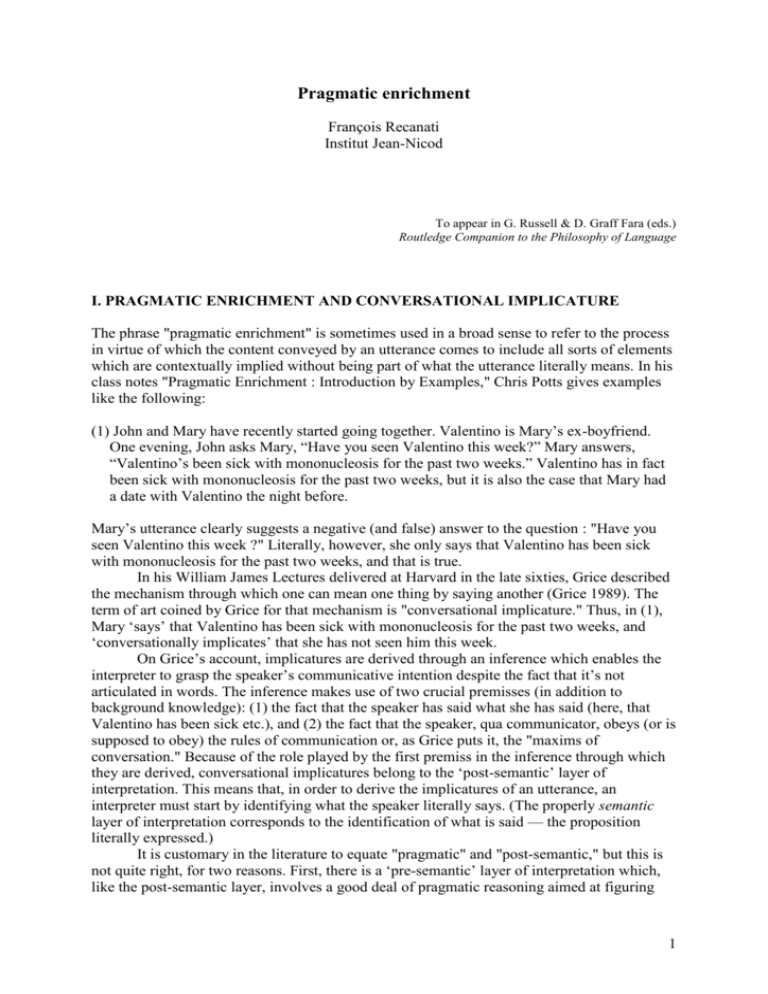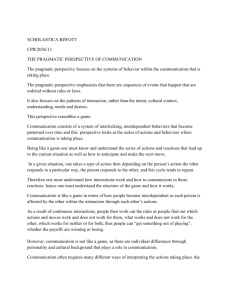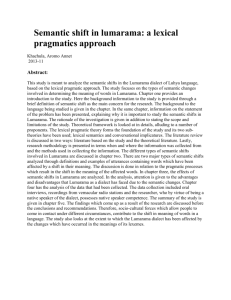Pragmatic enrichment - Hal Institut Jean
advertisement

Pragmatic enrichment François Recanati Institut Jean-Nicod To appear in G. Russell & D. Graff Fara (eds.) Routledge Companion to the Philosophy of Language I. PRAGMATIC ENRICHMENT AND CONVERSATIONAL IMPLICATURE The phrase "pragmatic enrichment" is sometimes used in a broad sense to refer to the process in virtue of which the content conveyed by an utterance comes to include all sorts of elements which are contextually implied without being part of what the utterance literally means. In his class notes "Pragmatic Enrichment : Introduction by Examples," Chris Potts gives examples like the following: (1) John and Mary have recently started going together. Valentino is Mary’s ex-boyfriend. One evening, John asks Mary, “Have you seen Valentino this week?” Mary answers, “Valentino’s been sick with mononucleosis for the past two weeks.” Valentino has in fact been sick with mononucleosis for the past two weeks, but it is also the case that Mary had a date with Valentino the night before. Mary’s utterance clearly suggests a negative (and false) answer to the question : "Have you seen Valentino this week ?" Literally, however, she only says that Valentino has been sick with mononucleosis for the past two weeks, and that is true. In his William James Lectures delivered at Harvard in the late sixties, Grice described the mechanism through which one can mean one thing by saying another (Grice 1989). The term of art coined by Grice for that mechanism is "conversational implicature." Thus, in (1), Mary ‘says’ that Valentino has been sick with mononucleosis for the past two weeks, and ‘conversationally implicates’ that she has not seen him this week. On Grice’s account, implicatures are derived through an inference which enables the interpreter to grasp the speaker’s communicative intention despite the fact that it’s not articulated in words. The inference makes use of two crucial premisses (in addition to background knowledge): (1) the fact that the speaker has said what she has said (here, that Valentino has been sick etc.), and (2) the fact that the speaker, qua communicator, obeys (or is supposed to obey) the rules of communication or, as Grice puts it, the "maxims of conversation." Because of the role played by the first premiss in the inference through which they are derived, conversational implicatures belong to the ‘post-semantic’ layer of interpretation. This means that, in order to derive the implicatures of an utterance, an interpreter must start by identifying what the speaker literally says. (The properly semantic layer of interpretation corresponds to the identification of what is said — the proposition literally expressed.) It is customary in the literature to equate "pragmatic" and "post-semantic," but this is not quite right, for two reasons. First, there is a ‘pre-semantic’ layer of interpretation which, like the post-semantic layer, involves a good deal of pragmatic reasoning aimed at figuring 1 out the speaker’s communicative intention. Semantic interpretation takes disambiguated expressions as inputs, and computes their contents as a function of the contents of their constituents and the way they are syntactically combined (plus the context, when the sentence contains indexicals or context-sensitive expressions). No such computation can take place unless the sentence has been properly disambiguated. In this pre-semantic task, background knowledge and the presumption that the speaker obeys the maxims of conversation play an obvious role. As David Kaplan points out, if a haberdasher says "I am out of checks'" to a banker, "whether the utterance takes place in the store or at the bank will help the banker to determine what the haberdasher has said" (Kaplan 1978: 229), and it will do so by presemantically selecting the relevant reading for the word "check." Pragmatics is therefore involved at the pre-semantic level, just as it is involved at the post-semantic level. Pragmatics is also involved at the semantic level, and that is the second reason why one should reject the equation of "pragmatic" and "post-semantic." To compute the proposition expressed by an utterance, it is necessary to assign contextual values to indexicals, (unbound) pronouns etc. For example, if the speaker uses a demonstrative pronoun and says '"She is cute," the hearer must determine who the speaker means by "she" in order to fix the utterance's truth-conditional content. This contextual assignment of values to indexicals and pronouns is a pragmatic affair, just like disambiguation or the derivation of implicatures. In all three cases one has to use contextual cues (and the presumption that the speaker obeys the maxims of conversation) to figure out what the speaker’s intentions are. To sum up, utterance interpretation involves pragmatic reasoning at three levels : (i) at the pre-semantic level one must determine which (disambiguated) sentence is intended among various candidates compatible with the proferred signal ; (ii) at the semantic level one must assign contextual values to the context-sensitive elements in the sentence in order to determine the proposition expressed ; (iii) at the post-semantic level one must derive the conversational implicatures. Only in the last type of case (the implicatures) does the inference presuppose that the proposition expressed (what is said) has been identified. Now, pace Potts, the phrase "pragmatic enrichment" on its standard use is meant to contrast with "conversational implicature," instead of being a non-technical synonym for it (as it is for Potts). On the standard use, while conversational implicatures belong to the postsemantic layer of interpretation, pragmatic enrichment belongs to the semantic layer : it affects the proposition expressed by an utterance. This puts pragmatic enrichment in the same ballpark as the assignment of contextual values to indexicals and free pronouns. II. PRAGMATIC ENRICHMENT AND SEMANTIC UNDER-SPECIFICATION What, then, is the difference between pragmatic enrichment and the contextual assignment of values to indexicals and pronouns if both belong to the semantic layer of interpretation? Following Kaplan, let us call "content" the contribution an expression makes to the truthconditions of the utterance in which it occurs. Context-sensitive expressions are such that their linguistic meaning does not fix their content : their content depends upon the context. In the case of standard indexicals, pronouns, etc., the expression is like a free variable to which a content must be assigned in context, and its linguistic meaning merely constrains the contents which may be contextually assigned to it. For example, the linguistic meaning of the pronoun "she" in the above example carries gender and number features which (presuppositionally) constrain the reference of the pronoun : the reference must be a female individual. The content of the pronoun is whatever is assigned to it in the context of utterance (in virtue of the speaker’s intentions etc.), provided the assigned value satisfies the presuppositions carried by the pronoun. 2 In other cases, a contextual value is not directly assigned to the expression, but the content of the expression still depends upon the context. For example, "ready" and "tall," without an accompanying prepositional phrase, are context-sensitive because they can be used to ascribe different properties in different contexts — the property of being ready for the walk vs ready for dinner, or the property of being tall for a six-grader vs tall for a basketball player. Some authors talk of pragmatic enrichment in that sort of case : the meaning of "ready" or "tall," they say, is under-specified and has to be pragmatically enriched through the contextual provision of a meaning constituent expressible by means of a prepositional phrase ("for dinner," "for a six-grader"). Since the enrichment in question is mandatory, the meaning of the semantically under-specified item can be represented as involving a free variable to which a value must be contextually assigned: thus "ready" arguably means something like ready for x and "tall" means something like tall for an X. In the syntax, however, there arguably is no variable — only a semantically under-specified lexical item whose meaning carries what Kratzer (2009) has called a "conceptual" variable. The variable is introduced in the semantics, via the lexical entry for the item, while in the case of pronouns and indexicals, the lexical item occurring in the syntactic structure is itself (like) a variable. The treatment of context-sensitive expressions like "ready" and "tall" I have just described is actually controversial. Some authors think that, associated with lexical items like "ready" and "tall," there is a (covert) variable/pronominal expression in the syntax (Stanley 2000, Marti 2006). In context, a value must be assigned to that covert variable, just as a contextual value must be assigned to overt pronouns. If this is true, then there is no need to talk of semantic under-specification or pragmatic enrichment in that sort of case — it is just an ordinary case of contextual assignment of value to pronominal elements in syntactic structure. In other cases, however, the idea of semantic under-specification triggering pragmatic enrichment may be harder to resist. Thus Kratzer (2010) says that "pragmatic enrichment is not just allowed, but required, for the interpretation of noun-noun compounds like swan boat." Neither "swan" nor "boat" is context-sensitive (let us assume) — both lexical items have a content independent of context — but the compound "swan boat" is : its content must be pragmatically fixed through the contextual provision of a relevant relation R between swans and boats, such that only boats bearing that relation to swans end up in the extension of "swan boat." What we seem to have here is constructional context-sensitivity : the contextdependence of the content of "swan boat" is not inherited from the context-dependence of the contents of its parts, but comes from the construction itself. The content of the noun-noun construction is semantically under-specified : it has to be fleshed out through the contextual provision of the relevant relation R. To be sure, there have been has attempts to provide ‘indexical’ analyses of compound nouns (CNs). Thus, according to Weiskopf (2007 : 175), The linguistic meaning of CNs contains a phonologically unrealized open variable or otherwise indexical expression that picks out the relation among their constituents, and this relation is filled in by pragmatic mechanisms that draw on features of the context of utterance. But the variable R* which Weiskopf posits is introduced via the semantic rules associated with the noun-noun construction, which he calls the "rules of CN Interpretation," e.g. : [[N1 N2]] =λx[N’2(x)&R∗ (x,N’1)] So it is, as he puts it, "the meaning of CNs" which carries the variable. The variable in 3 question is therefore a conceptual variable and is not supposed to be present in the syntax. (In this respect it is somewhat misleading to say that the variable is "phonologically unrealized," for that notion only applies to elements present in syntactic structure.) III. FREE PRAGMATIC ENRICHMENT I have just illustrated the use of the phrase "pragmatic enrichment" in connection with semantic under-specification and conceptual variables. On that use it is possible to say, as Kratzer does, that pragmatic enrichment is required for the interpretation of a given type of expression. But that is not the standard use of the phrase "pragmatic enrichment." On the standard use, pragmatic enrichment is never required. It is the standard use of the phrase (and the phenomenon it designates) which I will focus on in what follows. On the standard use, just as it contrasts with conversational implicatures, pragmatic enrichment contrasts with the assignment of values to free variables, whether the variables in question are construed as conceptual (introduced via lexical entries) or syntactic. What characterizes the contextual assignment of values to free variables of all categories is that it is mandatory : no proposition is expressed unless a value is assigned to the variable. Thus if I say "John is ready" but the context does not answer the question : "ready for what ?", I haven’t said anything definite ; I haven’t expressed a complete proposition. Similarly, if I say "she is cute" but no individual can be contextually singled out as the reference of the demonstrative pronoun "she," no proposition has been expressed. Likewise, if I use the phrase "swan boat," but the context does not specify any relevant relation R between swans and boats, my utterance fails to express a complete content. In all these cases, where the provision of some contextual element is mandatory, I talk of "saturation" : a slot has to be contextually filled, which leaves the utterance semantically incomplete in case it remains unfilled. In contrast, pragmatic enrichment — or more explicitly : free pragmatic enrichment — is not mandatory but optional. There is enrichment in that sense only when the following three conditions are jointly satisfied : (i) the context adds some element to the interpretation of the utterance ; (ii) that element is truth-conditionally relevant, it affects the proposition expressed (so this is unlike conversational implicatures); yet (iii) its contextual provision is not necessary, in the sense that, if that element was left aside, the utterance would still express a complete proposition (this is in contrast to indexicals, pronouns, and the other type of context-sensitive expressions we talked about above). Consider the following example, due to Robyn Carston : (2) Jean went to Austria last week and she ran into John. One naturally interpret the second conjunct ("she ran into John") as expressing the proposition that Jean ran into John in Austria. The location of the event of running into John is contextually assumed to be the same as the location mentioned in the first conjunct, but that assumption is defeasible, as contextual assumptions typically are. What is important, however, is that the contextual provision of a location for the event mentioned in the second conjunct is not mandatory : it is perfectly ok to interpret a sentence like "she ran into John" as saying that Jean ran into John in some place or other, without the place in question being contextually specified or specifiable. This is in contrast with standard indexicals or pronouns : for the sentence does not express a complete proposition unless the indexicals or unbound pronouns it contains are assigned definite values. IV. PRAGMATIC MODULATION IN GENERAL 4 Free enrichment is only one type of case in which a pragmatic process that is optional (in contrast to the contextual assignment of values to indexicals and free variables of all sorts) nevertheless affects the proposition expressed. In Literal Meaning and subsequent work, I used the term "modulation" (as opposed to "saturation") as a generic term for the entire class. The general idea is this : In context the meaning of words is adjusted or 'modulated' so as to fit what is being talked about. Sense modulation is essential to speech, because we use a (more or less) fixed stock of lexemes to talk about an indefinite variety of things, situations and experiences. Through the interaction between the context-independent meanings of our words and the particulars of the situation talked about, contextualised, modulated senses emerge, appropriate to the situation at hand. (Recanati 2004 : 131) Saturation is a pragmatic process of contextual value-assignment that is triggered (and made obligatory) by something in the sentence itself, namely the linguistic expression to which a value is contextually assigned. The expression itself acts as a variable in need of contextual instantiation. So pragmatics comes into play (in order to determine which value to assign in context to the variable), but it does so under the guidance of the linguistic material : the pragmatic process of saturation is a ‘bottom-up’ process in the sense that it is signaldriven, not context-driven. In contrast, modulation is a ‘top-down’ or ‘free’ pragmatic process, i.e. a process which is not triggered by an expression in the sentence but is contextdriven and takes place for purely pragmatic reasons — in order to make sense of what the speaker is saying. Modulation operates on the meaning of an expression (simple or complex) and returns a meaning of the same type. In free enrichment, the output sense is more specific than the input sense. Free enrichment typically works by narrowing down the extension of an expression through the contextual addition of a component to its meaning. For example, through free enrichment, the (intransitive) verb "to smoke" can come to mean to smoke marijuana, if the context makes it clear that that’s what we are talking about. What is added to the meaning of the verb is a specification of its internal accusative — the type of thing smoked — just as in (2) what is added is a specification of the location of the event of running into John. Sense extension (also called loosening or broadening) is another modulation process which works in the opposite direction : the meaning of an expression is made less specific, and its extension typically wider, through the contextual deletion of a component of its meaning (Cohen 2002 : chapters 3 and 5 ; Franks 1995). Thus consider (3) The ATM swallowed my credit card This can be given a literal reading, if we imagine a context à la Putnam in which ATMs turn out to be living organisms (for only living organisms can swallow). But the sentence can also and typically will be interpreted non-literally. In an ordinary context, "swallow" will be given an extended sense, corresponding to what ATMs sometimes do with credit cards (something which, indeed, resembles swallowing). The sentence may be true, on such a reading, even though no real swallowing takes place. Another key modulation process is predicate transfer (Nunberg 1995). In predicate transfer the input sense is a property F, and the output sense is another property F’, definable in terms of F, along the following lines : F’ =def x [(Qy : Rx,y) Fy] 5 In this schema representing the transferred property F’, "Q" and "R" are place-holders for, respectively, a quantificational determiner and a relation that are left free (within certain limits) and will be determined in context. So F’ is the property one has whenever, for Q object y one bears relation R to, y is F. In Nunberg’s famous example, "I am parked out back," F is the property of being parked out back (a property only a vehicle can have), R is the ownership relation between cars and car owners, and Q may be the existential quantifier. F’, then, is the property of having a car that is parked out back. It is that property which the words "parked out back" arguably ascribe to the speaker in "I am parked out back." V. THE ‘SYNTACTIC’ APPROACH Even though free enrichment is only one type of modulation among others, the phrase "pragmatic enrichment" is often used as a generic term, synonymous with my own term "pragmatic modulation." One reason for this is that modulation can be thought of as operating on expressions (‘syntactic’ construal), rather than directly on their meanings (‘semantic’ construal). When so construed, modulation amounts to supplementing the overt expression with implicit elements, and so it counts as a form of ‘enrichment’, whatever its semantic effect. On the semantic construal of pragmatic modulation, the meaning of an expression is mapped to a distinct meaning. On the syntactic construal, it is the expression (or a corresponding mental representation) that is mapped to a more complex expression/representation through the addition of extra elements. For example, a sentence like (4) has several readings : (4) There is a lion in the middle of the piazza On one reading "lion" is given a non-literal interpretation through predicate transfer and (4) may be true even if, literally, there is no lion in the middle of the piazza (but only a statue of a lion). An advocate of the ‘syntactic’ approach to pragmatic modulation will argue that "lion" is mapped to "representation of a lion" through the addition of an operator REPRESENTATION OF. Likewise, sense extension will be said to proceed through the addition of some kind of similarity operator. On this view pragmatic modulation always is a form of enrichment or supplementation of a (linguistic or mental) representation, making it into a more complex representation. The syntactic approach to pragmatic modulation has one putative advantage over the semantic approach : it can provide a simple response to an argument against pragmatic enrichment known as the "binding argument." According to the argument, implicit elements of content (e.g. the implicit reference to Austria in the second conjunct of (2)) cannot, in general, be due to free pragmatic enrichment, because the elements in question can be made to vary with the cases introduced by a quantifier, as in (5) Whenever I light a cigarette, it starts raining. On the most salient reading, this means that whenever I light a cigarette, it starts raining at the location where I light the cigarette. Here the location of the raining event is an implicit element of content, as is the location of the event of running into John in example (2) above, but it varies with the cases introduced by "whenever I light a cigarette." Implicit bound readings like this raise a problem for pragmatic enrichment accounts, Stanley (2000) argued, because binding requires a variable that can be bound (here, a location variable), and variables 6 are syntactic objects. According to free enrichment accounts of implicit content, however, the location in (2), (5) and similar examples is supposed to be inarticulated in the syntax, which means that there is no location variable in the syntax which could be bound ; nor could the variable be generated through pragmatic enrichment, since pragmatic enrichment (on the semantic construal) only maps meanings to meanings. However, assuming that this is correct and that implicit bound readings cannot be generated through pragmatic enrichment semantically construed, they can still be generated through pragmatic enrichment, syntactically construed. Nothing prevents the syntactic-enrichment process from contextually supplementing the overt sentence with implicit variables or pronouns directly or indirectly bound by the overt quantifier (Recanati 2002 : 338-42). VI. TWO VARIANTS OF THE ‘SYNTACTIC’ APPROACH There are two main variants of the ‘syntactic’ approach to pragmatic modulation : the naturallanguage (NL) variant and the language-of-thought (LOT) variant. On the NL variant, pragmatic enrichment is the process whereby a natural language expression (that which is actually uttered, e.g. the word "lion" in the above example) is mapped to another natural language expression ("lion statue"), which is not uttered but might have been, and which can be contextually recovered from the sentence that is actually uttered. This is the ‘shorthand’ view put forward (inter alia) by Kent Bach (1994, 2000) and Stephen Neale (2000, 2004). On this view modulation works by enriching or supplementing the sentence with contextually recoverable extra materials, as in the following examples, due to Kent Bach : Jack and Jill went up the hill [together]. Jack and Jill are married [to each other]. Jill got married and [then] got pregnant. You’ll succeed if [and only if] you work hard. There are [approximately] 30 students per class. France is hexagonal [roughly speaking]. Otto has [exactly] three cars. Felix has always been an honest judge [since he’s been a judge]. Adele hasn’t had lunch [today]. You’re not going to die [from this cut]. As Bach (2000 : 262-63) puts it, "we generally speak loosely, omitting words that could have made what we meant more explicit and letting our audience fill in the gaps." In such cases "what the speaker means is a qualified version of what he is saying. He would have to utter the words in brackets (or roughly equivalent words—the exact words don’t matter) to make what he meant more explicit." The words in question "are not part of the sentence (these are not cases of syntactic ellipsis) but the speaker could have uttered them if he deemed that necessary." On the LOT variant, put forward by relevance theorists (Sperber and Wilson 1986, Carston 2002) and by Jerry Fodor (2001), natural language expressions are assumed to translate into language of thought strings (sometimes called "semantic" or "conceptual" representations). Pragmatic enrichment is the process whereby the language of thought string into which the uttered expression translates is contextually enriched with extra symbols, to which nothing corresponds in the uttered expression. It is the richer language of thought string resulting from the enrichment process which determines the (intuitive) truth-conditions of the utterance : the truth-conditions of the utterance are the truth-conditions one gets by subjecting 7 the contextually enriched LOT string (rather than the natural language sentence or its mentalese translation) to model-theoretic interpretation. As Paul Elbourne points out, the NL variant is more constrained than the LOT variant. "Enrichment in [the first kind of] theory can only yield meanings that could be obtained by syntactically building on the material present in the syntax [of the natural language expression]. No such constraint is present in the [other kind of] theory" (Elbourne 2008 : 95). "Theories of [the second] kind, then, are potentially vulnerable in the following way: if a reading turns out to be unavailable for a given sentence, they cannot avail themselves of syntactic constraints to explain its absence, (…) and they will face real difficulty if the reading in question can be argued to be pragmatically plausible" (Elbourne 2010). Still, it is easy to introduce an analogous constraint into the LOT variant, and it is that sort of hybrid view which Stephen Neale seems to be defending. On such a hybrid view a LOT string is considered as an admissible enrichment of (the mentalese translation of) the uttered sentence only if it is the mentalese translation of a sentence one can get by supplementing the uttered sentence with extra materials. Even if we take the syntactic constraint on board, there is an obvious overgeneration objection looming. Many readings one could get by freely enriching the uttered sentence with extra words are simply not available (Stanley 2002, 2005, Elbourne 2010). Extra constraints will therefore be needed to filter out the absent readings. (See Elbourne 2008 and Hall 2008 for attempts to address some of the overgeneration worries.) Overgeneration is also a problem for semantic approaches to pragmatic modulation. In general, pragmatic modulation/enrichment is such a powerful mechanism that it needs to be suitably constrained. Thus predicate transfer as a general mechanism ought to make it possible to interpret the sentence "I was once driven by Jean Gabin" to mean that the speaker owns a car that was once driven by Jean Gabin. That reading is very unlikely, however, for reasons that are essentially pragmatic and are well-worth investigating (see Nunberg 1979, 1995 for a pragmatic approach to the constraints on predicate transfer). VII. IS PRAGMATIC ENRICHMENT RELEVANT TO SEMANTICS ? It is tempting to appeal to pragmatic enrichment/modulation whenever an element of meaning, e.g. the location of the event of running into John in (2), remains implicit yet seems to be truth-conditionally relevant. The standard strategy in linguistics consists in dealing with such examples by positing unpronounced elements in the syntax. But in many cases, such covert elements can only be detected by pragmatic means, and there is only a short step from the idea that they are detected on a pragmatic basis to the idea that they are generated on a pragmatic basis. As Ariel Cohen (2009) puts it, if an element is phonologically null, the hearer can’t hear it ; if the hearer nevertheless proceeds as if that element was present, s/he must apply some reinterpretation of the input so as to introduce that element. Modulation is the case in which such reinterpretation proceeds on a purely pragmatic basis. Despite the appeal of the idea, and the fact that it promises to simplify both syntax and semantics, there is deep resistance to it and it has been rather under-utilized in formal semantics. In the final sections of this entry, I discuss what I take to be the main sources of resistance, besides the overgeneration worry which has already been mentioned. First and foremost, there is resistance to the very idea that free pragmatic processes might affect ‘what is said’ – the proposition expressed by an utterance — as suggested by the idea that modulation belongs to the semantic layer of interpretation. Free pragmatic processes are pragmatic processes that are not mandated by the linguistic material but take place for wholly pragmatic reasons, in order to make sense of the speaker. They are ‘top down’ processes, rather than ‘bottom up’ pragmatic processes triggered by something in the 8 linguistic signal. That such processes could affect what is said seems to be a contradiction in terms. ‘What is said’, the truth-conditional content of an utterance, is what is literally said, and that — by definition — has to be determined by the conventions of the language. Pragmatics can enter the picture, provided its role is to assign a contextual value to a lexical item in a bottom-up manner, i.e. in accord with (and under the guidance of) the conventional meaning of that context-sensitive item. In contrast, what King and Stanley (2005 : 118-119) call "strong pragmatic effects," i.e. pragmatic effects achieved in order to make sense of the speech act without being linguistically mandated, take us into the realm of speaker’s meaning, away from literal meaning. Insofar as this argument is based upon a certain understanding of the phrase "what is said" (or "what is literally said"), it is not substantive, but verbal. There is no doubt that one can define "what is said" in such a way that only weak pragmatic effects can affect what is said. But what the advocate of pragmatic modulation means by "what is said" corresponds to the intuitive truth-conditional content of the utterance. Now, the intuitive truth-conditions of an utterance of (3) or (4) above are affected by free pragmatic processes of predicate transfer or sense extension. (4) can be intuitively true even though no real lion stands in the middle of the piazza, and (3) can be true even though no real swallowing takes place. So there is a sense of "what is said" in which what is said is affected by pragmatic modulation. Assuming this is true, this does not prevent us from defining another notion of what is said, conforming to literalist standards. The second objection to pragmatic modulation (or rather, to the idea that it affects semantic content) is the following. If free pragmatic processes are allowed to affect semantic content, semantic content leaps out of control — it is no longer determined by the rules of the language but varies freely, à la Humpty Dumpty. But then, how can we account for the success of communication ? Communication (content sharing) becomes a miracle since there is nothing to ensure that communicators and their adressees will converge on the same content. Now communication is possible (it takes place all the time), and there is no miracle. It follows that we should give up the view that free pragmatic processes play a role in the determination of semantic content (Cappelen and Lepore 2005: chapter 8). This argument fails, I believe, because the problem it raises is a problem for everybody. Whenever the semantic value of a linguistic expression (e.g. the reference of a demonstrative) must be pragmatically inferred, the question arises, what guarantees that the hearer will be able to latch on to the exact same semantic value as the speaker? Whether the pragmatic process at stake is saturation or modulation is irrelevant as far as this issue is concerned, so the argument fails as an argument specifically intended to cast doubt on pragmatic modulation. VIII. THE SYSTEMATICITY OBJECTION The most important source of resistance to the idea of pragmatic modulation is the fear that, if something like pragmatic modulation is allowed as a determinant of semantic content, the project of constructing a systematic, truth-conditional semantics for natural language will be doomed to failure. Here is a first sketch of an argument for that conclusion : In contrast to the contextual assignment of values to indexicals, modulation is not driven by the linguistic meaning of words. Nothing in the linguistic meaning of the words whose sense is modulated tells us that modulation ought to take place. Modulation takes place purely as a matter of context, of ‘pragmatics’ ; what drives it is the urge to make sense of what the speaker is saying. So modulation is unsystematic. 9 If we allow it as a determinant of semantic content, we make it impossible to construct a systematic theory of semantic content. Thus formulated, the argument is not convincing. Let us grant the objector that modulation is unsystematic. Still, it is easy to make room for it within a systematic semantics (Pagin and Pelletier 2007 ; Westerståhl forthcoming). In general, nothing prevents unsystematic factors from being handled systematically, by being assigned their proper place in the theory. In the case at hand, assuming the semantic approach to pragmatic modulation, we can define a function mod taking as argument an expression e and the context c in which it occurs : the value of mod is the particular modulation function g that is contextually salient/relevant/appropriate for the interpretation of that expression in that context. If no modulation is contextually appropriate and the expression receives its literal interpretation, the value of mod will be the identity function. In this framework, we can distinguish between the literal sense of a simple expression e, namely its semantic interpretation I(e), and the modulated sense M(e)c carried by an occurrence of e in context c. The modulated sense of an expression e (in context c) results from applying the contextually appropriate modulation function mod (e, c) = g to its semantic interpretation I(e): M(e)c = mod (e, c) (I(e)) = g (I(e)) So far, this is very standard : in distinguishing I(e) from M(e)c we are just appealing to the traditional semantics/pragmatics distinction. What is not standard is the claim that the semantic interpretation of a complex expression (e.g. a sentence) is a function of the modulated senses of its parts and the way they are put together (Recanati 2010 : chapter 1). This is what examples like (3) and (4) suggest if we take at face value the effects of modulation on truth-conditional content which they seem to display. On the resulting view the semantic process of composition and the pragmatic process of sense modulation are intertwined. For simple expressions, their semantic interpretation is their literal sense, but for complex expressions pragmatic modulation is allowed to enter into the determination of semantic content. This is nonstandard, for sure, but there is nothing unsystematic about this view. The systematicity objection can be understood differently, however. In introducing modulation (in contrast to saturation), I said that in saturation "pragmatics comes into play, but does so under the guidance of the linguistic material," whereas modulation "is not triggered by an expression in the sentence but takes place for purely pragmatic reasons — in order to make sense of what the speaker is saying." This suggests that, insofar as it involves modulation, utterance interpretation does not significantly differ from "the kind [of interpretation] involved in interpreting kicks under the table and taps on the shoulder" (Stanley 2000: 396). Stanley objects that "we do not interpret these latter sorts of acts by applying highly specific rules to structured representations," as formal semanticists say we do in the linguistic case. Accepting the semantic relevance of pragmatic modulation thus seems incompatible with the programme of formal semantics, according to which utterance interpretation is a systematic affair and differs, in this respect, from the (pragmatic) interpretation of gestures. Thus understood, however, I think the objection is confused. Even though free pragmatic processes, i.e. pragmatic processes that are not mandated by the standing meaning of any expression in the sentence, are allowed to enter into the determination of truthconditional content, still, in the framework I have sketched, they come into the picture as part of the compositional machinery. Semantic interpretation remains grammar-driven even if, in the course of semantic interpretation, pragmatics is appealed to not only to assign contextual 10 values to indexicals and free variables but also to freely modulate the senses of the constituents in a top-down manner. Semantic interpretation is still a matter of determining the sense of the whole as a function of the (possibly modulated) senses of the parts and the way they are put together. References Bach, K. (1994) "Conversational Impliciture," Mind and Language 9 : 124-62. Bach, K. (2000) "Quantification, Qualification and Context," Mind and Language 15 : 26283. Cappelen, H. and Lepore, E. (2005) Insensitive Semantics, Oxford : Blackwell. Carston, R. ( 2002) Thoughts and Utterances : The Pragmatics of Explicit Communication, Oxford: Blackwell. Cohen, A. (2009) "No Quantification without Reinterpretation," Workshop Genericity : Interpretation and Uses, Paris, May 2009. Cohen, L. J. (2002) Knowledge and Language : Selected Essays, Dordrecht : Kluwer. Elbourne, P. (2008) "The Argument from Binding," Philosophical Perspectives 22: 89-110. Elbourne, P. (2010) "Incomplete Descriptions and Sloppy Identity," Contextualism and Compositionality workshop, Paris, 17-19 May 2010. Fodor, J. (2001) "Language, Thought and Compositionality," Mind and Language 16 : 1-15. Franks, B. (1995) "Sense Generation : A ‘Quasi-Classical’ Approach to Concepts and Concept Combination," Cognitive Science 19 : 441-505. Grice, P. (1989) Studies in the way of Words, Cambridge, Mass.: Harvard University Press. Hall, A. (2008) "Free Enrichment or Hidden Indexicals?" Mind and Language 23: 426-56. Kaplan, D. (1978) "DTHAT," Syntax and Semantics 9: 221-243. King, J. and Stanley, J. (2005) "Semantics, Pragmatics, and the Role of Semantic Content," in Z. Szabo (ed.) Semantics versus Pragmatics, Oxford : Clarendon Press, 111-64. Kratzer, A. (2010) Abstract for "Syntactic Constraints on Meaning Composition: Deriving the Meanings of Conditionals," Contextualism and Compositionality workshop, Paris, 17-19 May 2010. Kratzer, A. (forthcoming) Context and Modality, Oxford : Oxford University Press. Marti, L. (2006) "Unarticulated Constituents Revisited," Linguistics and Philosophy 29 : 13566. Neale, S. (2000) "On being Explicit : Comments on Stanley and Szabo, and on Bach," Mind and Language 15 : 284-94. Neale, S. (2004) "This, That and the Other," in M. Reimer & A. Bezuidenhout (eds.), Descriptions and Beyond, Oxford: Clarendon Press, pp. 68-182. Nunberg, G. (1979) "The Non-Uniqueness of Semantic Solutions : Polysemy," Linguistics and Philosophy 3 : 143-84. Nunberg, Geoffrey (1995) "Transfers of Meaning," Journal of Semantics 12: 109-32. Pagin, P. and Pelletier, J. (2007) "Context, Content and Communication," in G. Preyer and G. Peter (eds.) Context-Sensitivity and Semantic Minimalism, Oxford : Clarendon Press, 25-62. Potts, C. (2007) "Pragmatic Enrichment : Introduction by Examples," class notes, UMass, Amherst, Fall 2007. Recanati, F. (2002) "Unarticulated Constituents," Linguistics and Philosophy 25 : 299-345. Recanati, F. (2004) Literal Meaning, Cambridge : Cambridge University Press. Recanati, F. (2010) Truth-Conditional Pragmatics, Oxford : Oxford University Press. Sperber, D. and Wilson, D. (1986a) Relevance : Communication and Cognition, Oxford : Blackwell. Stanley, J. (2000) "Context and Logical Form," Linguistics and Philosophy 23 : 391-434. 11 Stanley, J. (2002) "Making It Articulated," Mind and Language 17: 149-68. Stanley, J. (2005) "Semantics in Context," in Preyer, G. and Peter, G. (eds.) Contextualism in Philosophy : Knowledge, Meaning, and Truth, Oxford : Clarendon Press, 221-53. Weiskopf, D. (2007) "Compound Nominals, Context, and Compositionality," Synthese 156 :161-204. Westerståhl, D. (forthcoming) "Compositionality in Kaplan Style Semantics," in Hinzen, W., Machery, E. and M. Werning (eds) The Handbook of Compositionality, Oxford: Oxford University Press. 12






